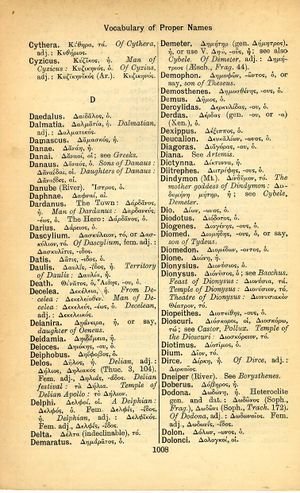Demosthenes
τά δέ ἄνευ συμπλοκῆς, οἷον ἄνθρωπος, βοῦς, τρέχει, νικᾷ → and the simple forms of speech, for example: 'man', 'ox', 'runs', 'wins'
English > Greek (Woodhouse)
Δημοσθένης, -ους, ὁ.
Latin > English (Lewis & Short)
Dēmosthĕnes: is (
I gen. i, Cic. Opt. Gen. 5, 14), m., Δημοσθένης, the most celebrated of the Grecian orators, Cic. de Or. 1, 13; 20; id. Brut. 9; Prop. 3 (4), 21, 27; Quint. 10, 1, 76; 12, 10, 23 sq.; Juv. 10, 114 et saep.—Hence,
II Dēmosthĕnĭcus, a, um, adj., Demosthenic: Demosthenicum, quod ter primum ille vocavit (i. e. action), Aus. Prof. 1, 19.
Latin > French (Gaffiot 2016)
Dēmosthĕnēs,¹¹ is, m. (Δημοσθένης), Démosthène [le célèbre orateur grec] : Cic. de Or. 1, 89 ; 1, 260 || -nĭcus, a, um, de Démosthène : Aus. Prof. 1, 19. gén. ī, Cic. Opt. 14 ; acc. em ou ēn.
Latin > German (Georges)
Dēmosthenēs, is u. ī, Akk. em u. ēn, m. (Δημοσθένης), der berühmte athenische Redner aus dem Demos Päania, der Verteidiger der griechischen Freiheit gegen Philipp von Mazedonien, Cic. de or. 1, 260; de opt. gen. 14 (wo Genet. -i); Tusc. 4, 55. Quint. 10, 1, 76. Iul. Val. 2, 15 (2, 5, wo Genet. -i). Iuven. 10, 114. (Vgl. Neue-Wagener Formenl.3 1, 473 u. Keil de emend. Plin. ep. 1, p. 11 über den Akk. auf em u. en). – Dav. Dēmosthenicus, a, um, demosthenisch, Auson. prof. (XVI) 2, 19. p. 56, 14 Schenkl. – u. Dēmosthenicē, Adv. demosthenisch, Prisc. 15, 37.

